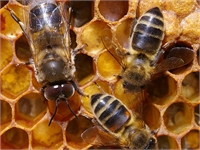
Are Bees the Newest Antibiotic?
Important Notice: Our web hosting provider recently started charging us for additional visits, which was unexpected. In response, we're seeking donations. Depending on the situation, we may explore different monetization options for our Community and Expert Contributors. It's crucial to provide more returns for their expertise and offer more Expert Validated Answers or AI Validated Answers. Learn more about our hosting issue here.

Are Bees the Newest Antibiotic?
You must be logged in to post a comment.
It sounds too good to be true, but you never know. Is it possible to combat MRSA with honey?
Australian Researchers have revealed the secret explaination for the deadly bug-killing properties of honey. Researcher, Shona Blair, from the University of Sydney, has found that when diluted honey is applied to moist wounds, it produces hydrogen peroxide, a known antibacterial agent.
Bees could play a key role in an urgently needed treatment to fight MRSA, the super bug that was either the underlying cause or a conributory factor in 1,900 deaths between 1996-2008. Scientists have found that a substance known as bee glue or propolis, originating from beehives in the Pacific region was active against MRSA which causes potentially fatal infections, particularly in hospital patients.
Bee Propolis is the sticky resin like substance found in the beehive. The bees gather resin from trees and plants and they use this mixture to stick the hive together and seal it. This substance also protects them from bacteria and disease–no colds or viruses get into the beehive.
Propolis is well known to have super antibacterial effects. More specifically, propolis has antibiotic, antimicrobial and antibacterial properties to promote helpful bacteria and kill harmful bacteria. Propolis is dark in color, rich in minerals, amino acids, fats and bioflavnoids. High in B-complex and contains vitamins C,E and provitamin A. It is rich in amino acids and is a source of zinc, magnanese, copper and iron.
Results have been highly encouraging and more research is needed to further understand how active substances in propolis work to seek the treatments which patients urgently require. The research is the first to report anti-MRSA activity in propolis originating from the Pacific region and is the first to describe the anti-MRSA properties of Propolin C and Propolin D. These could possibly act as templates for the development of improved anti-MRSA agents.